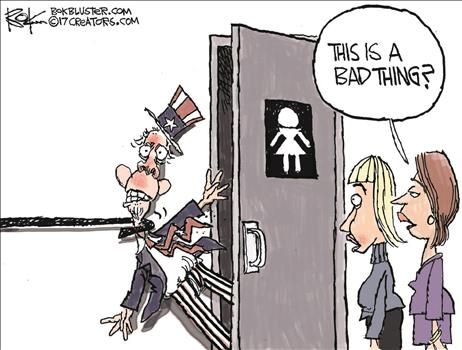Through personnel and policy, President Trump is limiting the executive branch.
David French
"Lost in most of the coverage of President Trump’s decision to rescind the Obama administration’s transgender mandates is a fundamental legal reality — the Trump administration just relinquished federal authority over gender-identity policy in the nation’s federally funded schools and colleges.
"In other words, Trump was less authoritarian than Obama. And that’s not the only case. Consider the following examples where his administration, through policy or personnel, appears to be signaling that the executive branch intends to become less intrusive in American life and more accountable to internal and external critique.
 "Trump nominated Neil Gorsuch to the Supreme Court, a man known not just for his intellect and integrity but also for his powerful legal argument against executive-branch overreach. Based on his previous legal writings, if Gorsuch had his way, the federal bureaucracy could well face the most dramatic check on its authority since the early days of the New Deal. By overturning judicial precedents that currently require judicial deference to agency legal interpretations, the Court could put a stop to the current practice of presidents and bureaucrats steadily (and vastly) expanding their powers by constantly broadening their interpretations of existing legal statutes.
"For example, the EPA has dramatically expanded its control over the American economy even without Congress passing significant new environmental legislation. Instead, the EPA keeps revising its interpretation of decades-old statutes like the Clean Air Act, using those new interpretations to enact a host of comprehensive new regulations. If Gorsuch’s argument wins the day, the legislative branch would be forced to step up at the expense of the executive, no matter how “authoritarian” a president tried to be.
"Trump nominated Neil Gorsuch to the Supreme Court, a man known not just for his intellect and integrity but also for his powerful legal argument against executive-branch overreach. Based on his previous legal writings, if Gorsuch had his way, the federal bureaucracy could well face the most dramatic check on its authority since the early days of the New Deal. By overturning judicial precedents that currently require judicial deference to agency legal interpretations, the Court could put a stop to the current practice of presidents and bureaucrats steadily (and vastly) expanding their powers by constantly broadening their interpretations of existing legal statutes.
"For example, the EPA has dramatically expanded its control over the American economy even without Congress passing significant new environmental legislation. Instead, the EPA keeps revising its interpretation of decades-old statutes like the Clean Air Act, using those new interpretations to enact a host of comprehensive new regulations. If Gorsuch’s argument wins the day, the legislative branch would be forced to step up at the expense of the executive, no matter how “authoritarian” a president tried to be.
 " Trump nominated H. R. McMaster to replace Michael Flynn as his national-security adviser. McMaster made his name as a warrior on battlefields in the Gulf War and the Iraq War, but he made his name as a scholar by writing a book, Dereliction of Duty, that strongly condemned Vietnam-era generals for simply rolling over in the face of Johnson-administration blunders and excesses. In his view, military leaders owe their civilian commander in chief honest and courageous counsel — even when a president may not want to hear their words.
" Trump nominated H. R. McMaster to replace Michael Flynn as his national-security adviser. McMaster made his name as a warrior on battlefields in the Gulf War and the Iraq War, but he made his name as a scholar by writing a book, Dereliction of Duty, that strongly condemned Vietnam-era generals for simply rolling over in the face of Johnson-administration blunders and excesses. In his view, military leaders owe their civilian commander in chief honest and courageous counsel — even when a president may not want to hear their words.
 "When the Ninth Circuit blocked Trump’s immigration executive order (which was certainly an aggressive assertion of presidential power), he responded differently from the Obama administration when it faced similar judicial setbacks. Rather than race to the Supreme Court in the attempt to expand presidential authority, it backed up (yes, amid considerable presidential bluster) and told the Ninth Circuit that it intends to rewrite and rework the order to address the most serious judicial concerns and roll back its scope." . . .
"When the Ninth Circuit blocked Trump’s immigration executive order (which was certainly an aggressive assertion of presidential power), he responded differently from the Obama administration when it faced similar judicial setbacks. Rather than race to the Supreme Court in the attempt to expand presidential authority, it backed up (yes, amid considerable presidential bluster) and told the Ninth Circuit that it intends to rewrite and rework the order to address the most serious judicial concerns and roll back its scope." . . .


No comments:
Post a Comment